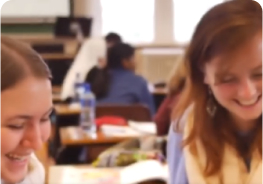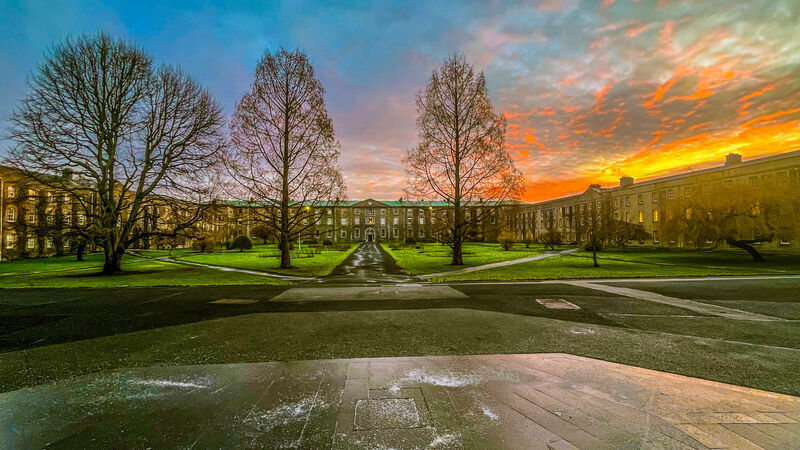Professional Programmes - Full Time |
1 Year |
| Fees and Funding | |
Application Deadline: |
30th August 2024
For EU & those living on the island of Ireland (Late applications may be considered). |
|
30th April 2024
For non EU |
|
Course Start Date: |
23rd September 2024 |
| Apply now |
Introduction
Higher Diploma in Youth Ministry and Spirituality
Description
The Higher Diploma in Youth Ministry and Spirituality is a one-year full-time or two-year part-time programme that equips learners to engage in practice as youth pastoral ministers in a professional manner. The programme design supports the academic, theological, pastoral, spiritual, personal, and professional development of learners and the development of skills and competencies in leadership with a further focus on growth in self-understanding.
The programme's structure ensures the integration of academic study with practice-based learning – accompanying young people in different pastoral situations and in diverse settings, including school, parish, and youth centres (clubs and projects). Learning happens through course work, participation in seminars, human development, exploration of learner’s own personal faith journey, and placement education. The study of fundamental pedagogical concepts and theories is complemented and enhanced by ongoing practical experience on placement where learners develop practical skills needed to minister professionally and effectively.
The programme structure facilitates learners to develop both pastoral knowledge and professional skills for youth ministry in a Catholic context and provides opportunities to specialise in aspects of practice.
The programme provides a pathway to further studies in programmes at level 9, e.g. MTh in Pastoral Theology.
The programme commences in September 2024 with the registration and recruitment of new students (with individual and group interviews) conducted during the academic year 2023 in line with the normal college admissions guidelines and dates.
Course Code - MU722
Career Outcomes
The Higher Diploma in Youth Ministry and Spirituality programme provides a qualification for Youth Pastoral Ministers (YPM). It offers a grounding in Catholic faith education and placement education experience in youth-care, so that graduates can accompany and empower young people in the present generation and global culture. Learners are equipped to accompany young people in different pastoral situations and in diverse settings, including school, parish, and youth centres (clubs and projects). The programme provides support for, and enhancement of, professional skills with a strong focus on youth ministry and application of complex and specialised knowledge to the field of pastoral theology.
Graduates of the Higher Diploma in Youth Ministry and Spirituality are prepared and equipped to be:
- Employable in pastoral ministry contexts working with young people.
- Critical and creative thinkers: introductory modules prepare learners for a deeper level of analysis which is reinforced and assessed during subsequent levels of study.
- Literate and effective communicators: Graduates will be able to relate and communicate effectively. This is stimulated by group assignments, oral presentations and written course work tasks that learners undertake throughout their studies.
- Global in outlook and engaged in communities: during their studies, learners learn to appreciate diversity and build awareness of different cultures in a global context.
- Social, ethically and environmentally aware: learners develop social, ethical, and environmental responsibility skills.
The programme allows for progression to further studies in programmes at level 9, e.g. MTh in Pastoral Theology.
Course Structure
This section shows the modules typically available as part of the Higher Diploma in Youth Ministry and Spirituality and its credit value. Both part-time and full time learners study 60 credits over 1 or 2 years (2 or 4 semesters). Learners are on placement throughout the programme with a further period of placement-based learning taking place in the summer semester, after other modules are complete. The course may be offered in both full-time and part-time modes. The full time mode is an attractive option for international learners or those taking a sabbatical. The course structure is validated by St Patrick’s Pontifical University every 5 years, but it can change by adapting to feedback from a variety of sources. All modules are core modules. Learners must pass all modules in order to complete the programme, irrespective of their pathway.
Application Requirements
Admissions requirements
Entry requirements for the Higher Diploma in Youth Ministry and Spirituality (Code - MU722 ) have been set in order to select potential students who have the proven academic ability to undertake a Level 8 Higher Diploma course.
The admissions policy aims to attract and recruit motivated applicants across the full range of possible access routes. Students may have a background in any academic discipline. The overriding principle upon which admission decisions are based is that applicants should be likely to benefit from and succeed on the course.
Minimum entry requirements for the course
Formal Education
Applicants are required to have a recognised degree qualification where theology is at least a minor component.
Applicants with other degrees may be considered if they have relevant experience in pastoral ministry to young people. They will be required to take courses in theology to qualify for admission to the programme. Evidence of such employment, its nature and level will be required. This will be considered in the interview process and the decision of the panel (see below) will be final.
English language requirement
Applicants must have:
- Had their secondary education taught and assessed in English; or
- An IELTS score of 6 with a minimum of 5.5 in the writing component or another English Language Test recognised by St Patrick’s Pontifical University.
Applicants whose first language is not English will be required to satisfy the English language requirement.
Interview
Applicants who have met the minimum entry requirements will be formally interviewed. The purpose of the interview is to determine the suitability of the candidate to undertake and complete the course. The panel will also consider any equivalent or non-standard admission qualifications. In so doing, the panel may require additional evidence from the candidate to support the candidate’s request for consideration for equivalency, such as the nature and level of the work experience.
Note: even if an applicant meets our minimum admission requirements, the University cannot guarantee a place on the course.
Recognition of Prior Learning
Applicants with prior certificated or experiential learning at the same level of the qualification for which they wish to apply are advised to contact the admissions team.
PLEASE NOTE: Application forms must be completed in full, and all documentation must be provided BEFORE an application can be considered. Applicants will not be called for interview if an application is incomplete.
For further information contact;
Admission Office,
St Patrick’s Pontifical University,
Maynooth,
County Kildare
Tel: 01 708 4778
Fax: 01 708 3477
Email: cmmadmissions@spcm.ie
Web Page: www.sppu.ie

If you live outside Ireland, check out our dedicated area for international students.
Let’s talk
For Undergraduate queries: email admissions@spcm.ie.
For Postgraduate queries: email pgadmissions@spcm.ie.
For The Centre for Mission & Ministries queries, email: cmmadmissions@spcm.ie.

